Holmes Institute: Technological Change and HRM Activities Report
VerifiedAdded on 2022/11/26
|12
|838
|291
Report
AI Summary
This report examines the impact of technological advancements, particularly artificial intelligence (AI) and robotics, on human resource management (HRM) activities and various occupations. It analyzes how AI and robotics are changing the societal landscape and the future of work. The report focuses on the impact of these technologies on doctors, accountants, and hotel managers, considering current demographics and future scenarios. It applies the universalistic theory of HRM to understand the relationship between HR practices and organizational performance. The report also provides recommendations for managers and employees to adapt to these changes, emphasizing the importance of training and evolving leadership approaches. The report concludes that AI and robotics may displace jobs, but also create opportunities for industrial automation and improved business processes.
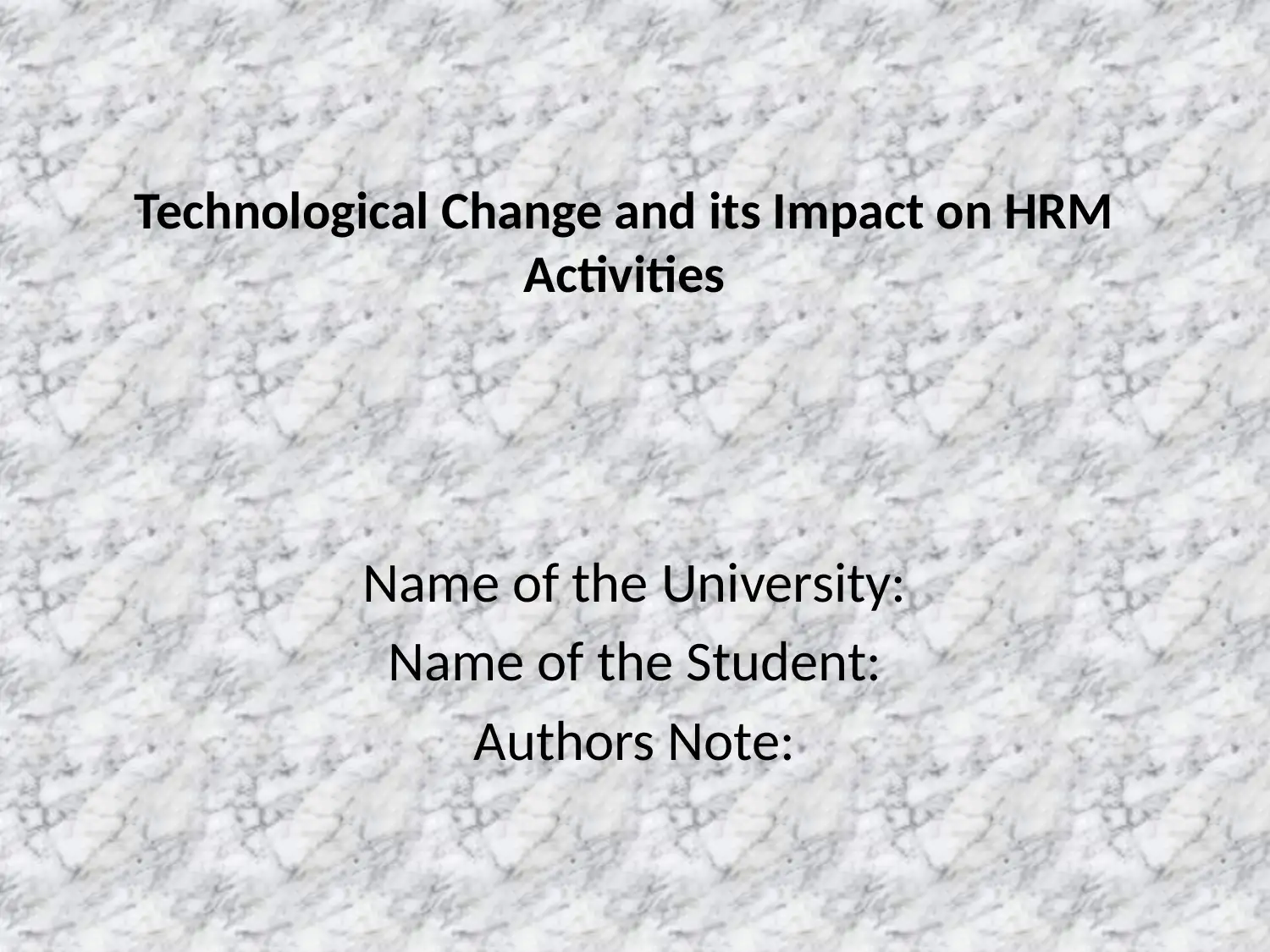
Technological Change and its Impact on HRM
Activities
Name of the University:
Name of the Student:
Authors Note:
Activities
Name of the University:
Name of the Student:
Authors Note:
Paraphrase This Document
Need a fresh take? Get an instant paraphrase of this document with our AI Paraphraser
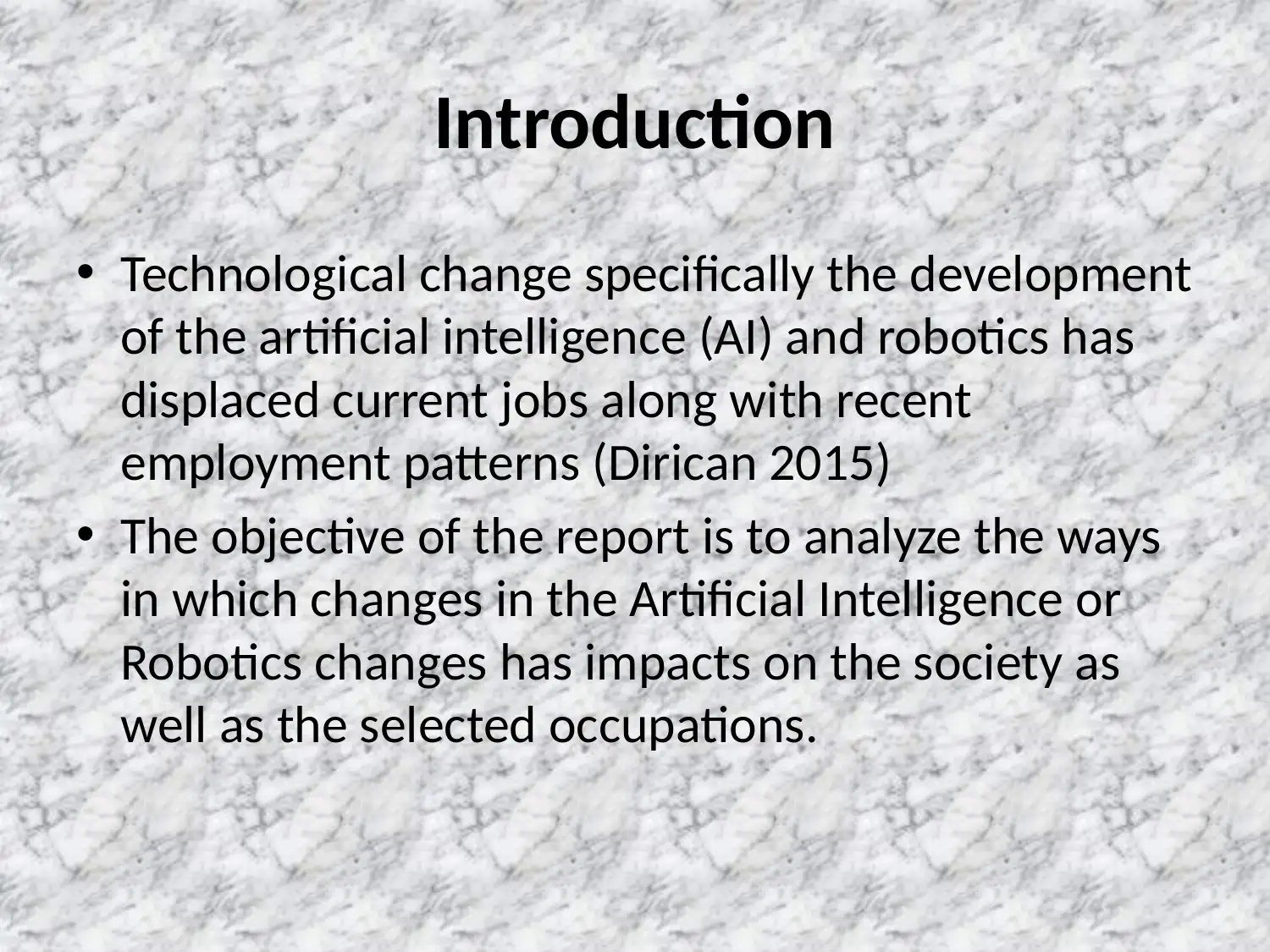
Introduction
• Technological change specifically the development
of the artificial intelligence (AI) and robotics has
displaced current jobs along with recent
employment patterns (Dirican 2015)
• The objective of the report is to analyze the ways
in which changes in the Artificial Intelligence or
Robotics changes has impacts on the society as
well as the selected occupations.
• Technological change specifically the development
of the artificial intelligence (AI) and robotics has
displaced current jobs along with recent
employment patterns (Dirican 2015)
• The objective of the report is to analyze the ways
in which changes in the Artificial Intelligence or
Robotics changes has impacts on the society as
well as the selected occupations.
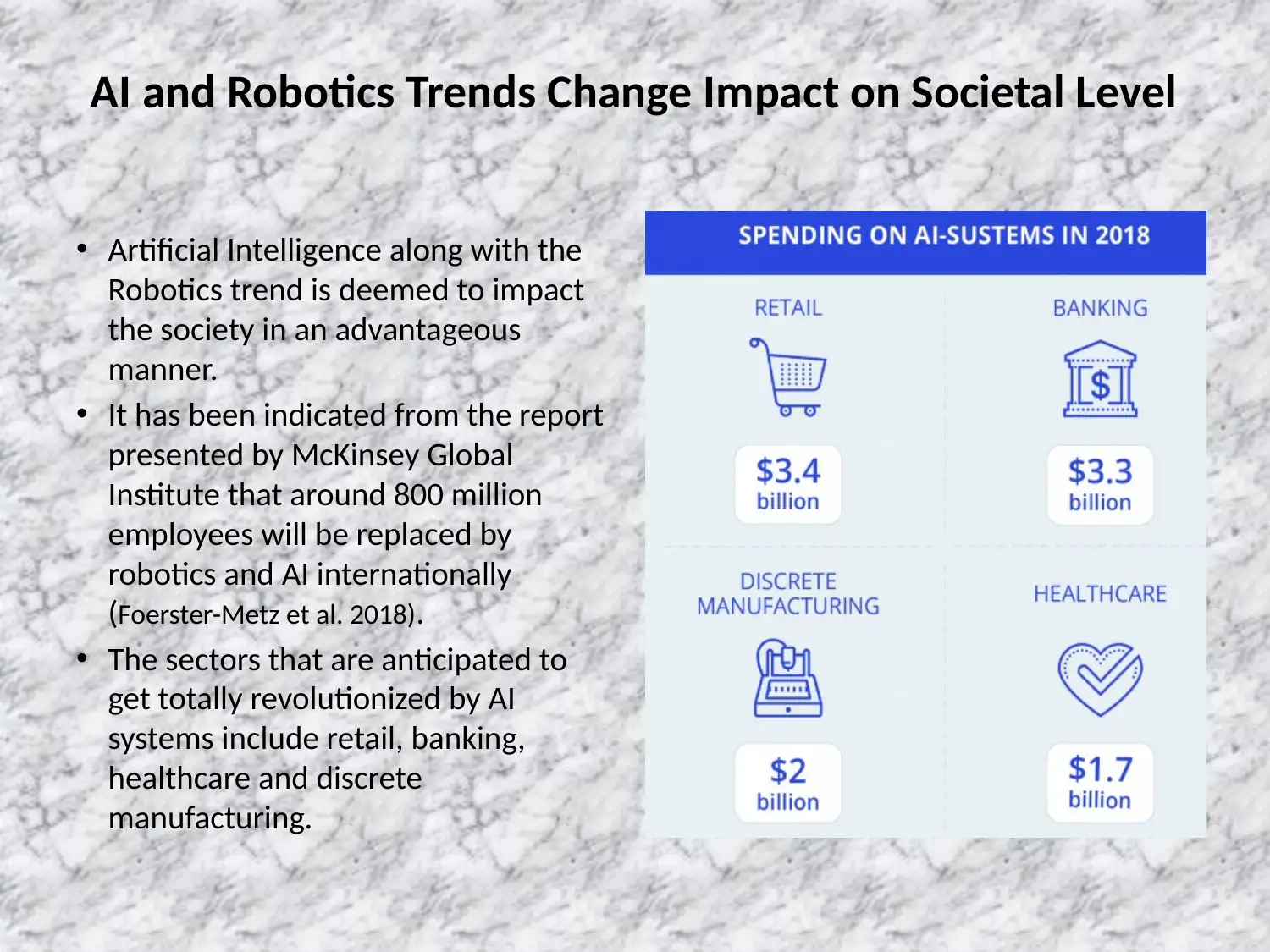
AI and Robotics Trends Change Impact on Societal Level
• Artificial Intelligence along with the
Robotics trend is deemed to impact
the society in an advantageous
manner.
• It has been indicated from the report
presented by McKinsey Global
Institute that around 800 million
employees will be replaced by
robotics and AI internationally
(Foerster-Metz et al. 2018).
• The sectors that are anticipated to
get totally revolutionized by AI
systems include retail, banking,
healthcare and discrete
manufacturing.
• Artificial Intelligence along with the
Robotics trend is deemed to impact
the society in an advantageous
manner.
• It has been indicated from the report
presented by McKinsey Global
Institute that around 800 million
employees will be replaced by
robotics and AI internationally
(Foerster-Metz et al. 2018).
• The sectors that are anticipated to
get totally revolutionized by AI
systems include retail, banking,
healthcare and discrete
manufacturing.
⊘ This is a preview!⊘
Do you want full access?
Subscribe today to unlock all pages.

Trusted by 1+ million students worldwide
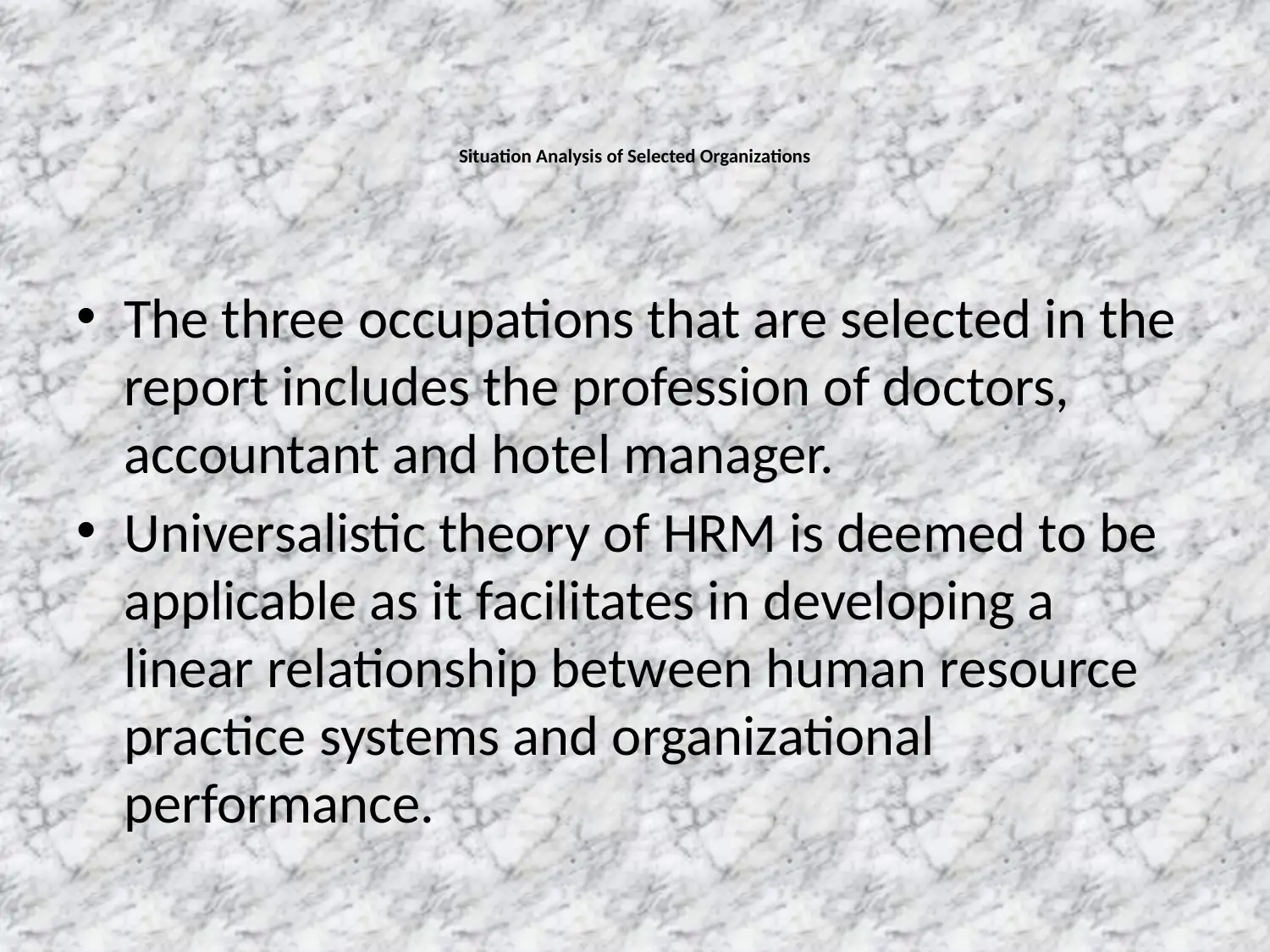
Situation Analysis of Selected Organizations
• The three occupations that are selected in the
report includes the profession of doctors,
accountant and hotel manager.
• Universalistic theory of HRM is deemed to be
applicable as it facilitates in developing a
linear relationship between human resource
practice systems and organizational
performance.
• The three occupations that are selected in the
report includes the profession of doctors,
accountant and hotel manager.
• Universalistic theory of HRM is deemed to be
applicable as it facilitates in developing a
linear relationship between human resource
practice systems and organizational
performance.
Paraphrase This Document
Need a fresh take? Get an instant paraphrase of this document with our AI Paraphraser
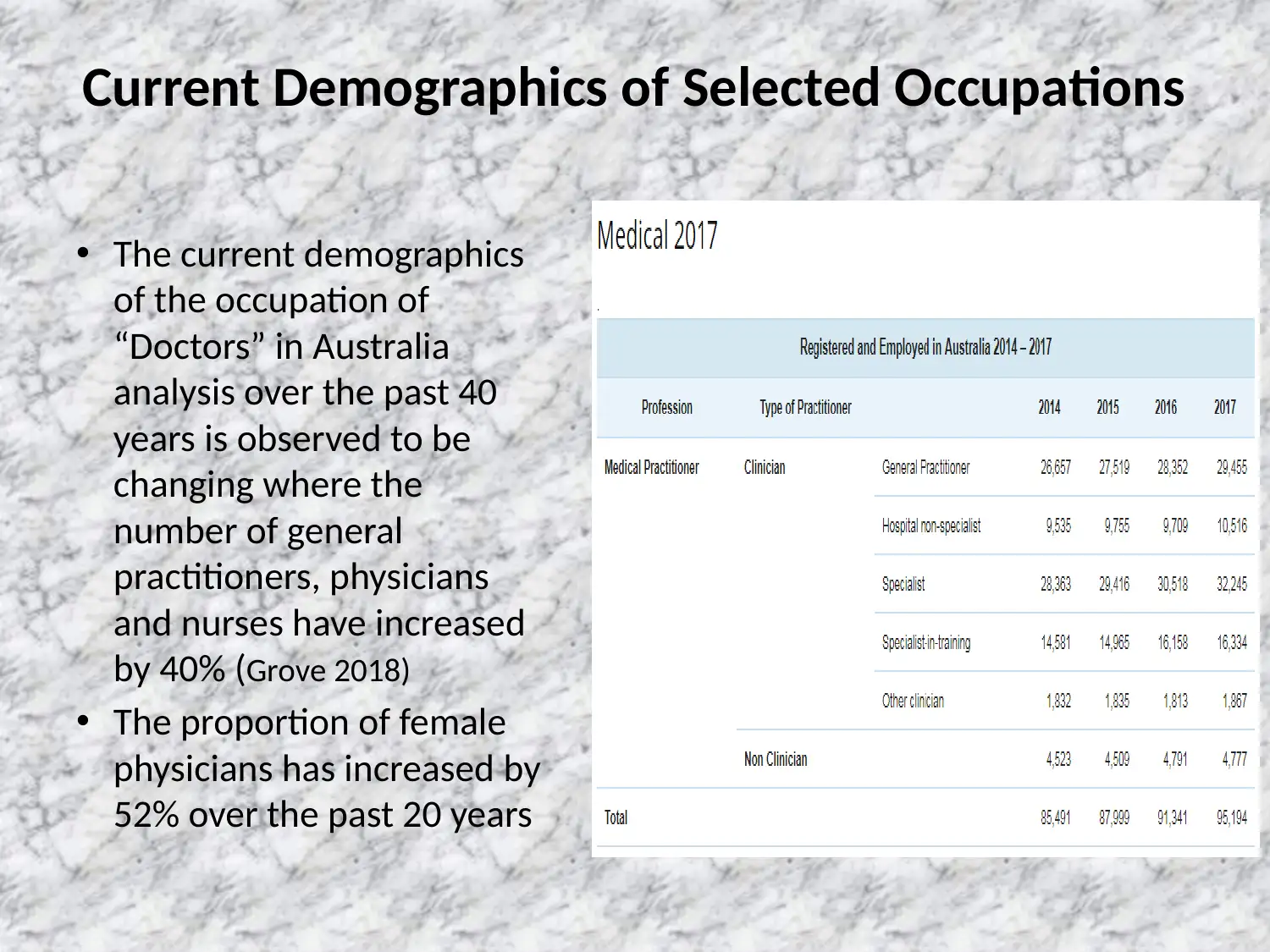
Current Demographics of Selected Occupations
• The current demographics
of the occupation of
“Doctors” in Australia
analysis over the past 40
years is observed to be
changing where the
number of general
practitioners, physicians
and nurses have increased
by 40% (Grove 2018)
• The proportion of female
physicians has increased by
52% over the past 20 years
• The current demographics
of the occupation of
“Doctors” in Australia
analysis over the past 40
years is observed to be
changing where the
number of general
practitioners, physicians
and nurses have increased
by 40% (Grove 2018)
• The proportion of female
physicians has increased by
52% over the past 20 years
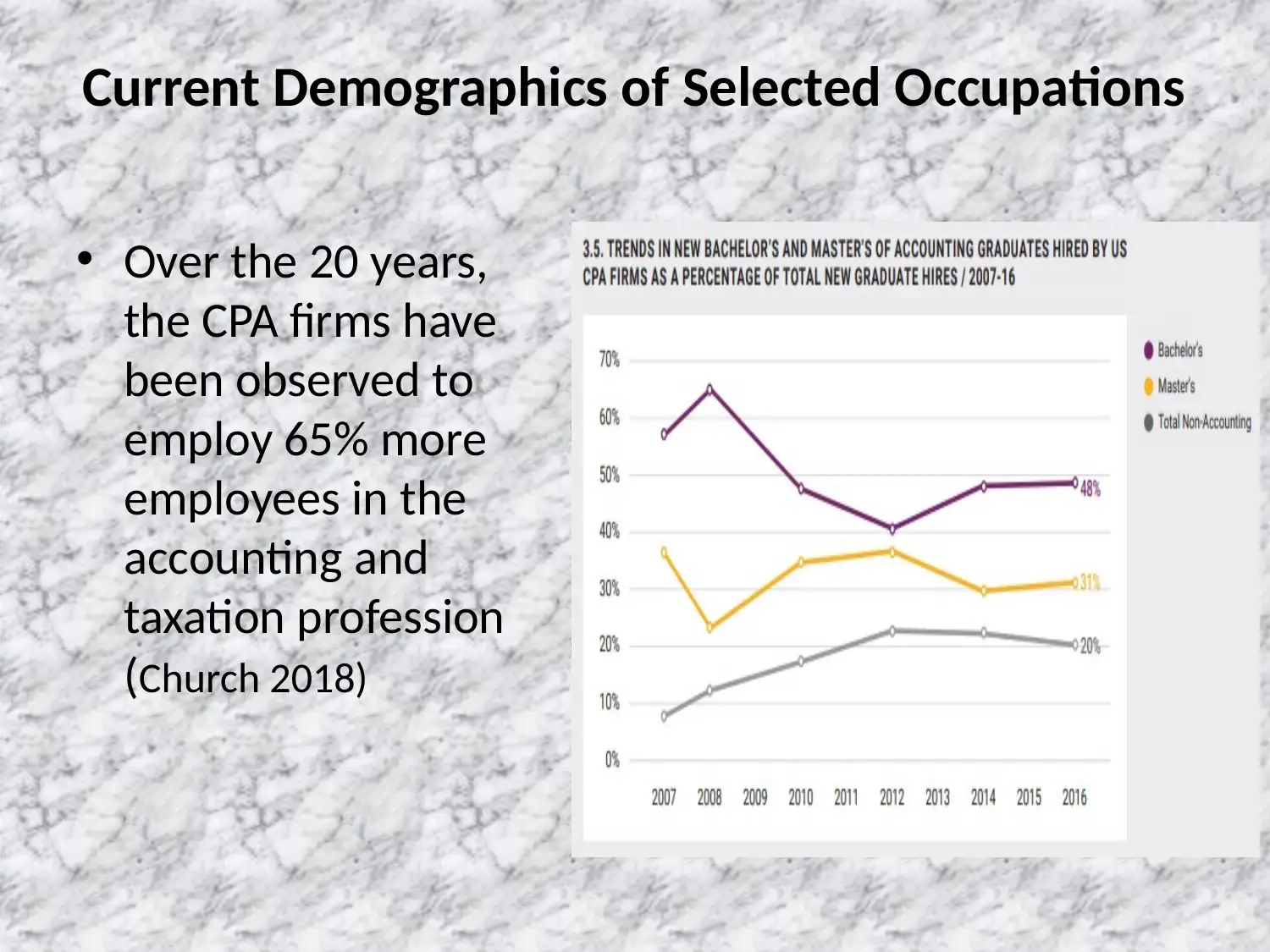
Current Demographics of Selected Occupations
• Over the 20 years,
the CPA firms have
been observed to
employ 65% more
employees in the
accounting and
taxation profession
(Church 2018)
• Over the 20 years,
the CPA firms have
been observed to
employ 65% more
employees in the
accounting and
taxation profession
(Church 2018)
⊘ This is a preview!⊘
Do you want full access?
Subscribe today to unlock all pages.

Trusted by 1+ million students worldwide
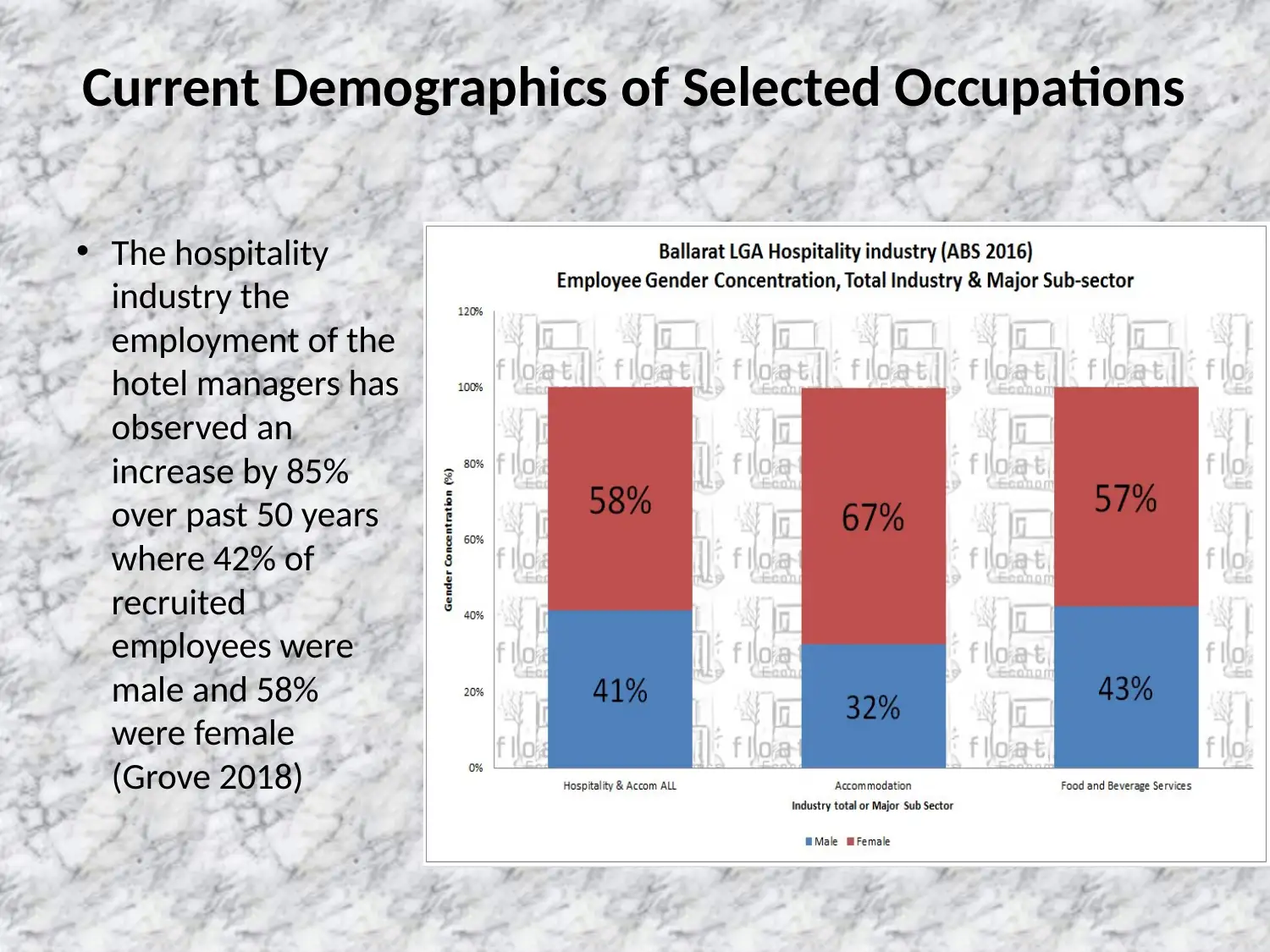
Current Demographics of Selected Occupations
• The hospitality
industry the
employment of the
hotel managers has
observed an
increase by 85%
over past 50 years
where 42% of
recruited
employees were
male and 58%
were female
(Grove 2018)
• The hospitality
industry the
employment of the
hotel managers has
observed an
increase by 85%
over past 50 years
where 42% of
recruited
employees were
male and 58%
were female
(Grove 2018)
Paraphrase This Document
Need a fresh take? Get an instant paraphrase of this document with our AI Paraphraser
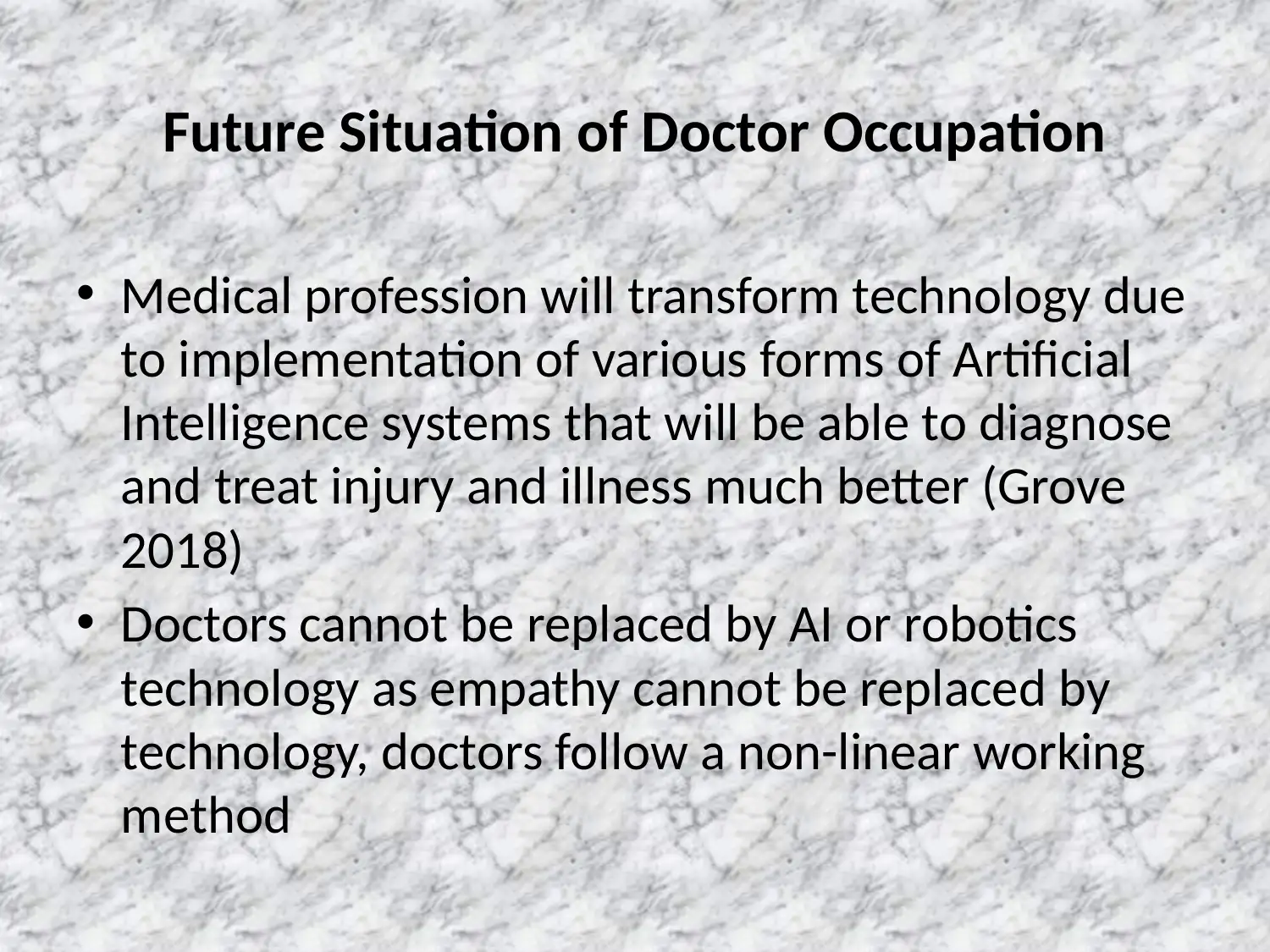
Future Situation of Doctor Occupation
• Medical profession will transform technology due
to implementation of various forms of Artificial
Intelligence systems that will be able to diagnose
and treat injury and illness much better (Grove
2018)
• Doctors cannot be replaced by AI or robotics
technology as empathy cannot be replaced by
technology, doctors follow a non-linear working
method
• Medical profession will transform technology due
to implementation of various forms of Artificial
Intelligence systems that will be able to diagnose
and treat injury and illness much better (Grove
2018)
• Doctors cannot be replaced by AI or robotics
technology as empathy cannot be replaced by
technology, doctors follow a non-linear working
method
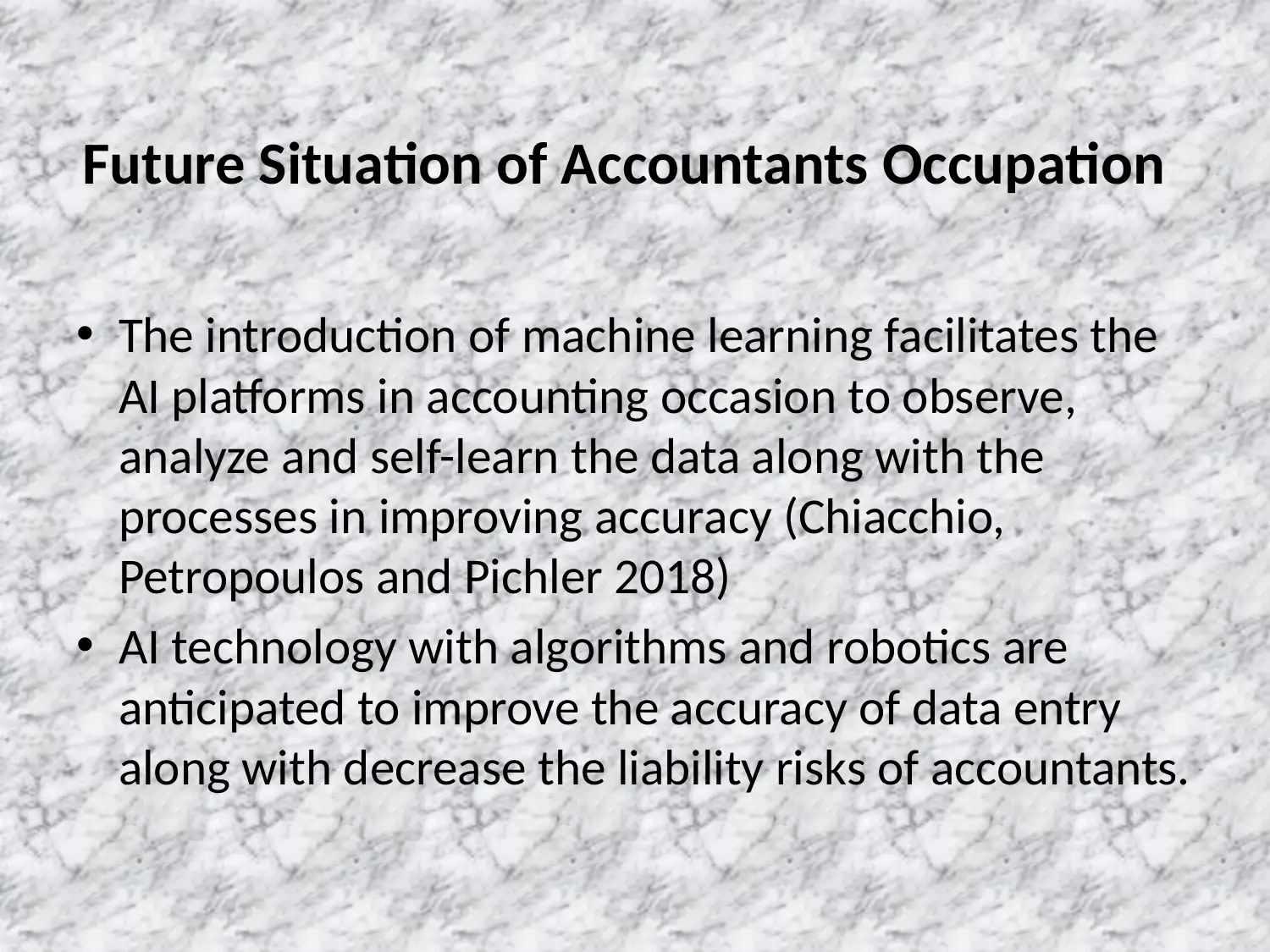
Future Situation of Accountants Occupation
• The introduction of machine learning facilitates the
AI platforms in accounting occasion to observe,
analyze and self-learn the data along with the
processes in improving accuracy (Chiacchio,
Petropoulos and Pichler 2018)
• AI technology with algorithms and robotics are
anticipated to improve the accuracy of data entry
along with decrease the liability risks of accountants.
• The introduction of machine learning facilitates the
AI platforms in accounting occasion to observe,
analyze and self-learn the data along with the
processes in improving accuracy (Chiacchio,
Petropoulos and Pichler 2018)
• AI technology with algorithms and robotics are
anticipated to improve the accuracy of data entry
along with decrease the liability risks of accountants.
⊘ This is a preview!⊘
Do you want full access?
Subscribe today to unlock all pages.

Trusted by 1+ million students worldwide
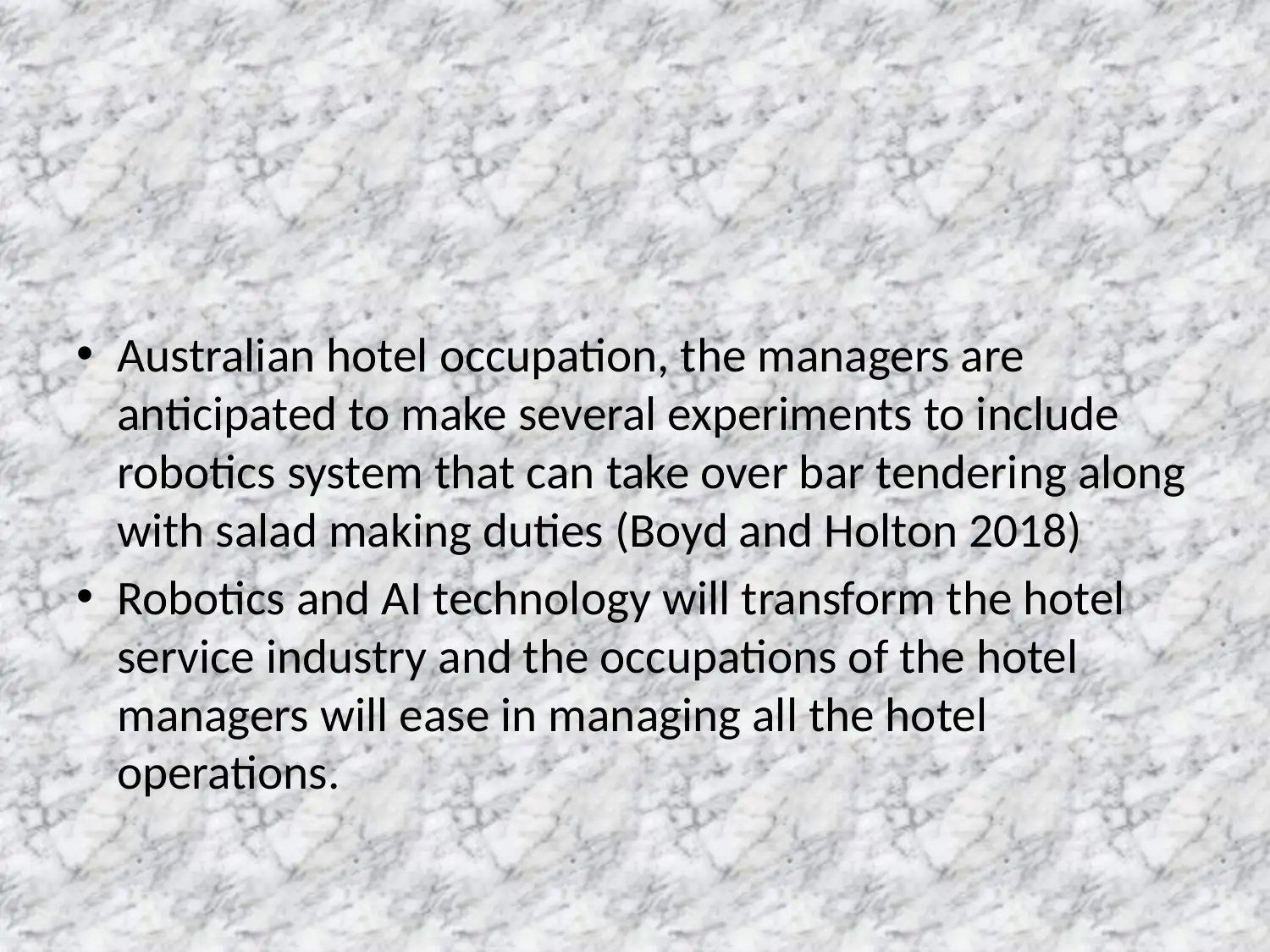
• Australian hotel occupation, the managers are
anticipated to make several experiments to include
robotics system that can take over bar tendering along
with salad making duties (Boyd and Holton 2018)
• Robotics and AI technology will transform the hotel
service industry and the occupations of the hotel
managers will ease in managing all the hotel
operations.
anticipated to make several experiments to include
robotics system that can take over bar tendering along
with salad making duties (Boyd and Holton 2018)
• Robotics and AI technology will transform the hotel
service industry and the occupations of the hotel
managers will ease in managing all the hotel
operations.
Paraphrase This Document
Need a fresh take? Get an instant paraphrase of this document with our AI Paraphraser
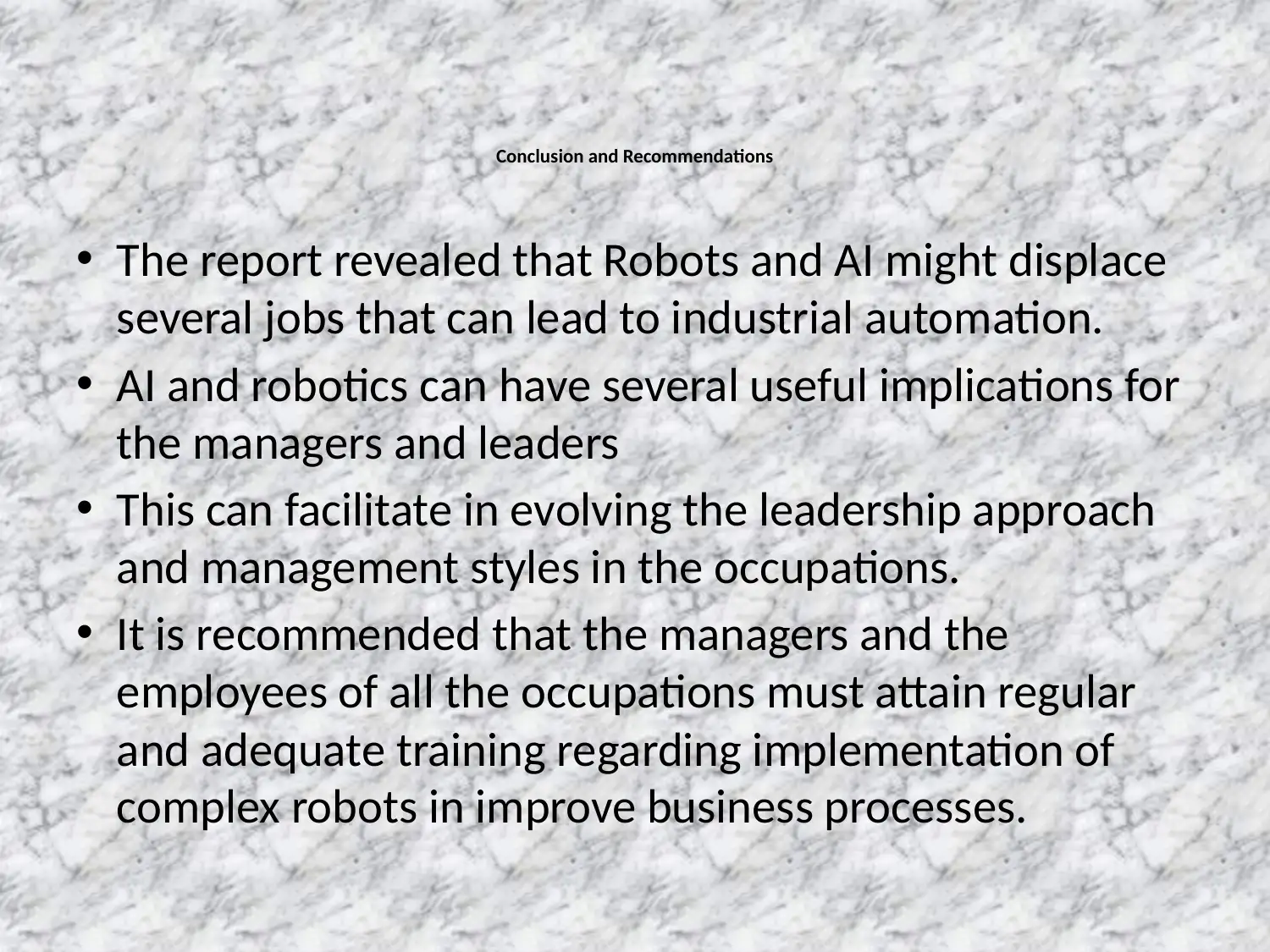
Conclusion and Recommendations
• The report revealed that Robots and AI might displace
several jobs that can lead to industrial automation.
• AI and robotics can have several useful implications for
the managers and leaders
• This can facilitate in evolving the leadership approach
and management styles in the occupations.
• It is recommended that the managers and the
employees of all the occupations must attain regular
and adequate training regarding implementation of
complex robots in improve business processes.
• The report revealed that Robots and AI might displace
several jobs that can lead to industrial automation.
• AI and robotics can have several useful implications for
the managers and leaders
• This can facilitate in evolving the leadership approach
and management styles in the occupations.
• It is recommended that the managers and the
employees of all the occupations must attain regular
and adequate training regarding implementation of
complex robots in improve business processes.
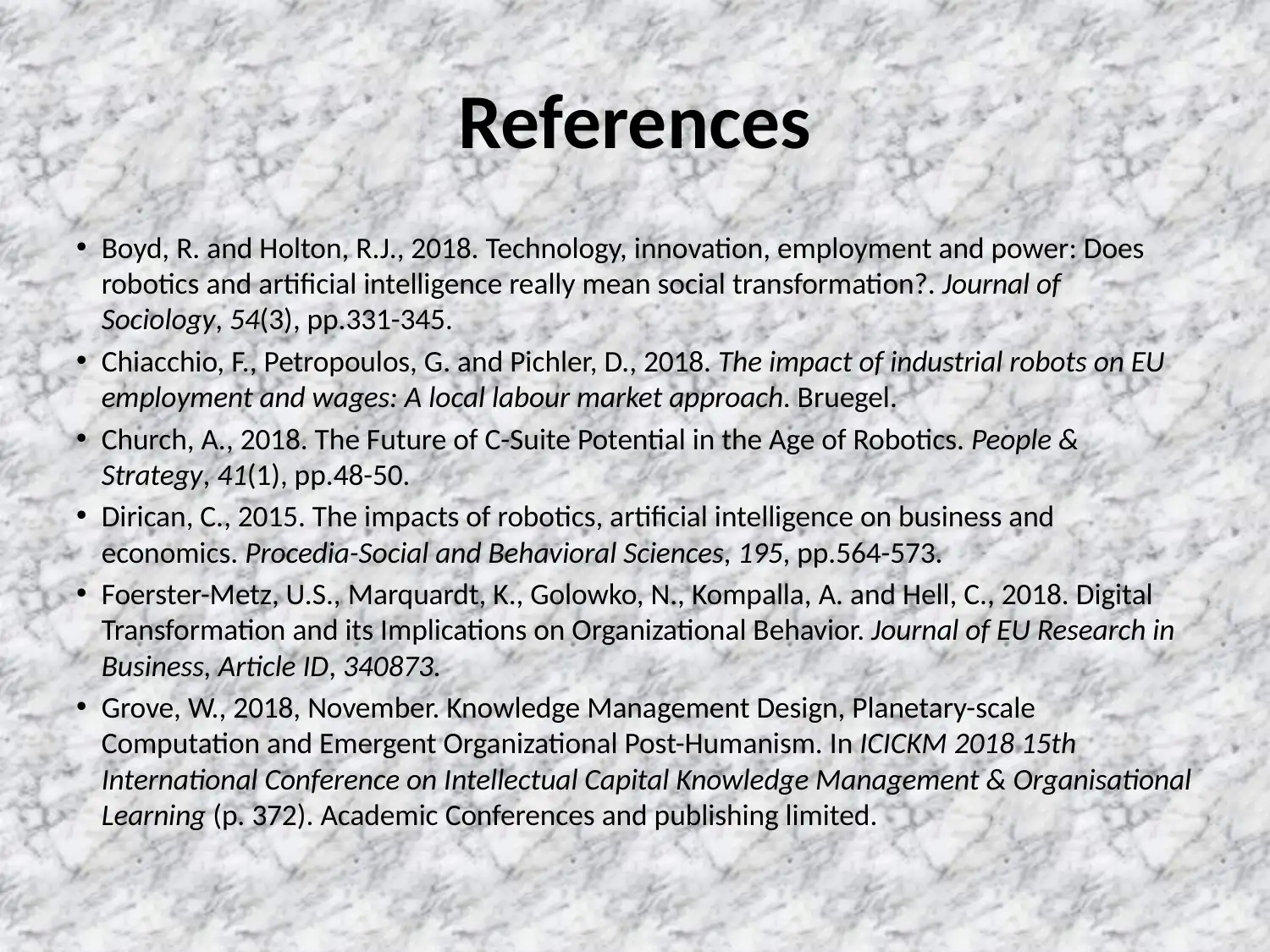
References
• Boyd, R. and Holton, R.J., 2018. Technology, innovation, employment and power: Does
robotics and artificial intelligence really mean social transformation?. Journal of
Sociology, 54(3), pp.331-345.
• Chiacchio, F., Petropoulos, G. and Pichler, D., 2018. The impact of industrial robots on EU
employment and wages: A local labour market approach. Bruegel.
• Church, A., 2018. The Future of C-Suite Potential in the Age of Robotics. People &
Strategy, 41(1), pp.48-50.
• Dirican, C., 2015. The impacts of robotics, artificial intelligence on business and
economics. Procedia-Social and Behavioral Sciences, 195, pp.564-573.
• Foerster-Metz, U.S., Marquardt, K., Golowko, N., Kompalla, A. and Hell, C., 2018. Digital
Transformation and its Implications on Organizational Behavior. Journal of EU Research in
Business, Article ID, 340873.
• Grove, W., 2018, November. Knowledge Management Design, Planetary-scale
Computation and Emergent Organizational Post-Humanism. In ICICKM 2018 15th
International Conference on Intellectual Capital Knowledge Management & Organisational
Learning (p. 372). Academic Conferences and publishing limited.
• Boyd, R. and Holton, R.J., 2018. Technology, innovation, employment and power: Does
robotics and artificial intelligence really mean social transformation?. Journal of
Sociology, 54(3), pp.331-345.
• Chiacchio, F., Petropoulos, G. and Pichler, D., 2018. The impact of industrial robots on EU
employment and wages: A local labour market approach. Bruegel.
• Church, A., 2018. The Future of C-Suite Potential in the Age of Robotics. People &
Strategy, 41(1), pp.48-50.
• Dirican, C., 2015. The impacts of robotics, artificial intelligence on business and
economics. Procedia-Social and Behavioral Sciences, 195, pp.564-573.
• Foerster-Metz, U.S., Marquardt, K., Golowko, N., Kompalla, A. and Hell, C., 2018. Digital
Transformation and its Implications on Organizational Behavior. Journal of EU Research in
Business, Article ID, 340873.
• Grove, W., 2018, November. Knowledge Management Design, Planetary-scale
Computation and Emergent Organizational Post-Humanism. In ICICKM 2018 15th
International Conference on Intellectual Capital Knowledge Management & Organisational
Learning (p. 372). Academic Conferences and publishing limited.
⊘ This is a preview!⊘
Do you want full access?
Subscribe today to unlock all pages.

Trusted by 1+ million students worldwide
1 out of 12
Related Documents
Your All-in-One AI-Powered Toolkit for Academic Success.
+13062052269
info@desklib.com
Available 24*7 on WhatsApp / Email
![[object Object]](/_next/static/media/star-bottom.7253800d.svg)
Unlock your academic potential
Copyright © 2020–2026 A2Z Services. All Rights Reserved. Developed and managed by ZUCOL.



